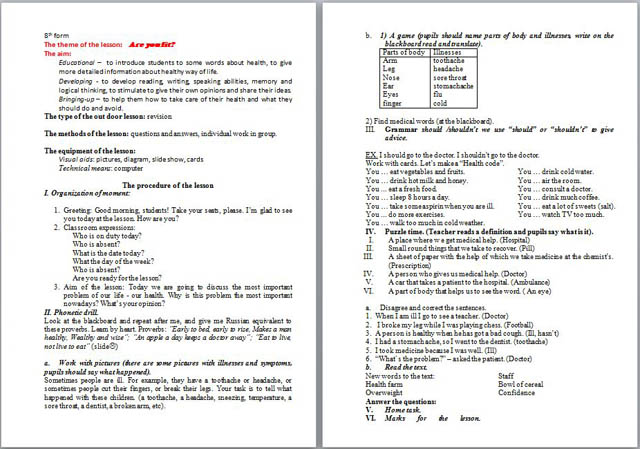The aim:
Educational – to introduce students to some words about health, to give more detailed information about healthy way of life.
Developing - to develop reading, writing, speaking abilities, memory and logical thinking, to stimulate to give their own opinions and share their ideas.
Bringing-up – to help them how to take care of their health and what they should do and avoid.
The procedure of the lesson.
I. Organization of moment:
Greeting: Good morning, students! Take your seats, please. I’m glad to see you today at the lesson. How are you?
Classroom expressions:
Who is on duty today?
Who is absent?
What is the date today?
What the day of the week?
Who is absent?
Are you ready for the lesson?
Aim of the lesson: Today we are going to discuss the most important problem of our life - our health. Why is this problem the most important nowadays? What’s your opinion?
II. Phonetic drill.
Look at the blackboard and repeat after me, and give me Russian equivalent to these proverbs. Learn by heart. Proverbs: “Early to bed, early to rise, Makes a man healthy, Wealthy and wise”; “An apple a day keeps a doctor away”; “Eat to live, not live to eat” (slideL)
Work with pictures (there are some pictures with illnesses and symptoms, pupils should say what happened).
Sometimes people are ill. For example, they have a toothache or headache, or sometimes people cut their fingers, or break their legs. Your task is to tell what happened with these children. (a toothache, a headache, sneezing, temperature, a sore throat, a dentist, a broken arm, etc).

a. 1) A game (pupils should name parts of body and illnesses, write on the blackboard read and translate).
2) Find medical words (at the blackboard).
III. Grammar should /shouldn’t we use “should” or “shouldn’t” to give advice.
EX. I should go to the doctor. I shouldn’t go to the doctor.
Work with cards. Let’s make a “Health code”.
You … eat vegetables and fruits.
You … drink hot milk and honey.
You... eat a fresh food.
You … sleep 8 hours a day.
You … take some aspirin when you are ill.
You... do more exercises.
You … walk too much in cold weather.
You … drink cold water.
You … air the room.
You … consult a doctor.
You … drink much coffee.
You … eat a lot of sweets (salt).
You … watch TV too much.
IV. Puzzle time. (Teacher reads a definition and pupils say what is it).
I. A place where w e get medical help. (Hospital)
II. Small round things that we take to recover. (Pill)
III. A sheet of paper with the help of which we take medicine at the chemist’s. (Prescription)
IV. A person who gives us medical help. (Doctor)
V. A car that takes a patient to the hospital. (Ambulance)
VI. A part of body that helps us to see the word. (An eye)
Весь материал - в документе.

 Получите свидетельство
Получите свидетельство Вход
Вход












 Урок английского языка на тему "Are you fit?" (27.14 КB)
Урок английского языка на тему "Are you fit?" (27.14 КB)
 0
0 1009
1009 165
165 Нравится
0
Нравится
0


